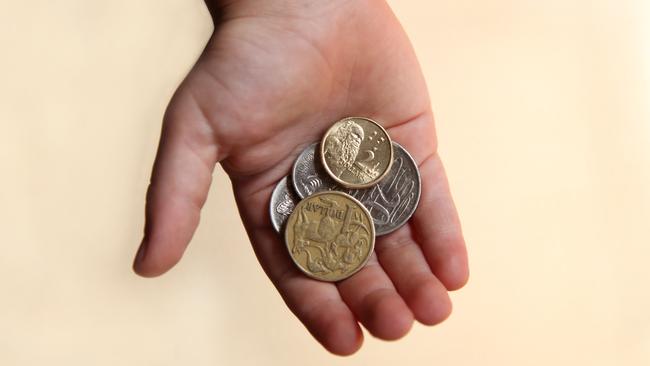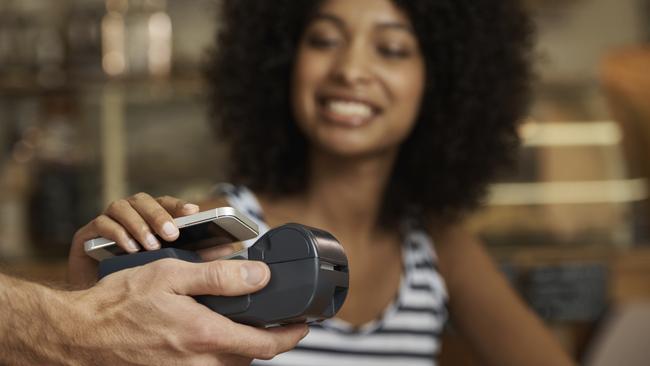Barefoot Investor: Rough and tumble will pay off for investors
This week the stock market got a smack in the gob, but instead of panicking let’s view short-term uncertainty as the price you pay for higher long-term returns, writes the Barefoot Investor.
Barefoot Investor
Don't miss out on the headlines from Barefoot Investor. Followed categories will be added to My News.
No wrestling in the kitchen!” I yelled.
If I’d told them once, I’d told them a thousand times.
They just wouldn’t bloody listen!
My eldest son grabbed his younger brother around the waist, lifted him up and attempted to do a signature “Stone Cold Steve Austin” power move.
The problem was his little bro had obviously been bulking up on his Weeties, and under the weight they swayed one way, and then the other, and then …
It was all too much, so he let go and his little bro’s face smashed straight into the corner of the dishwasher.
In the fake world of wrestling, it was a total knockout!
Yet there was nothing fake about the scene I was confronted with. There was blood absolutely everywhere, literally soaking his white shirt red.
“Kiss it better! Kiss it better!” he wailed as his little lip flapped in the air.
I stood there for a few seconds in shock, staring at the gruesome scene. And, just as I was about to save the day, Liz rushed in, simultaneously screaming, scooping him into her arms and scolding me for letting it happen (mums sure can multitask).
We rushed him to the hospital and when he came out to the waiting room he looked like one of those girls who’s had a bad lip-filler job.
Kinda pouty.
Well, this week the stock market got a smack in the gob and there was apparently a lot of blood spilt too:
“$1.5 trillion wipeout: Global markets plunge as virus panic grips investors”, screamed the headline in the SMH.
Crikey.
Of course another way you could write that headline is: “Share prices fall back to level not seen in six months”.
Look, I don’t want to make light of the current health crisis and, first and foremost, that is exactly what this is.
Yet, will investors still be talking about this in 10 years’ time?
Highly unlikely.
Here’s the truth: short-term uncertainty is the price you pay for higher long-term returns.
When you look back at the past 30 years of the stock market on a chart, it’s a beautiful picture:
A $10,000 investment in Aussie shares in 1990 would be worth $136,000 today — an annual return of 9.1 per cent. And that’s why this week I was taking advantage of the pouty prices and buying stocks.
Because the truth is, investing is a little like raising children:
One day you’ll look at a photo of you and your kids from 30 years ago and you’ll smile and you’ll have forgotten about all the fighting, the sleepless nights and the Wrestlemania moves gone wrong.
These are the good old days.
Tread Your Own Path!

Q&As
MY SON IS A THIEF
TED WRITES: Today my eight-year-old son stole $40 from my 10-year-old daughter’s purse and then shouted all his friends at the school canteen.
I am not sure how to deal with this one correctly so that both of my kids learn a lesson. Any advice from one dad to another?
BAREFOOT REPLIES: That’s a doozy, dude.
If it were me, I’d get my Judge Judy on, arrange a kitchen table court and dole out some tough justice.
First, I’d give your daughter the $40 back — after all, she’s done nothing wrong.
But there may be a lesson for her: 40 bucks to a 10-year-old is like $500 to you and me, so ask her whether at least some of that money would be better off in a bank account. (If she says yes, all you need to do is create a separate online saver in your name, and nickname it after her.)
She gets a shiny new account. Win!
Then I’d tell your son that he needs to pay you back the $40 plus interest.
(Personally, I’d make him pay it back double but my wife says I’m often too hard on my boys.)
Walking the dog, polishing shoes, taking out the garbage, whatever … until he pays off every single dollar.
The final lesson is for you: lock away the jam jars till payday!
TOO BROKE TO GO BROKE
SIMON WRITES: I am one of those “bastard bosses” you talk about — I am still about $40,000 behind on my employees’ super (including mine — I have not paid myself any super, ever).
I am also going broke. After six years of trying everything to stay afloat, including selling all my personal assets, my company ceased trading at the end of last month.
Now I am trying to work out what the hell to do from here. By the time I liquidate what’s left, there should be enough to pay out the employees’ super, but there will still be about $150,000 in debt, mostly to the ATO.
I’ve been advised to hire a liquidator, to do things correctly and end up with more to pay to their super, but I have been told it will cost about $15,000.
I know it’s all on me, but do you have any advice on what I should do next?
BAREFOOT REPLIES: I don’t think you’re a bastard boss — you gave it a go and you couldn’t make it work.
Fact is, more than 1000 small businesses go broke each week in Australia, according to data analysts Illion.
One option you have is to pay your employees their super, directly into their funds, with any money you have left.
As for the ATO, there are two ways to go: appoint your own (expensive) liquidator or wait for the ATO to eventually appoint its own. And if it works out that you’re personally liable, then really your only option is to negotiate a settlement with the ATO or declare bankruptcy.
My take?
The person who told you to see a liquidator was bang on. If you don’t, there’s a risk that you’ll open yourself up to even more trouble.
It’s time to let the nightmare play out.

BETTER THAN ANY SHOPPING SPREE!
JENNA WRITES: I am living proof that “paying it forward” can work. I was sitting in a cafe with my son one day having lunch.
He has cerebral palsy and is unable to feed himself, so I was feeding him and we were having a lovely time, oblivious to the world around us. When I went up to pay, the owner told me a complete stranger had already paid for our lunch and had asked the waiter to pass on the message that I was an amazing mum.
I was brought to tears by this kind gesture.
Fast forward one month and my son was in hospital having an operation.
In the recovery room, I overheard a lady asking the nurse about how to catch public transport to her hotel.
She was from a rural area and was with her tiny daughter, who had just endured an operation. I went up to her and asked if I could please pay for a taxi for them.
I explained that I was paying it forward and that it would be my pleasure to assist her. We hugged and had a bit of a cry.
It was a moment of connection with a complete stranger. Better than any shopping spree!
BAREFOOT REPLIES: Since writing that column, I’ve been overwhelmed with lovely responses like yours from people telling stories of how they’ve paid it forward and they’ve all told me the same thing: the high they got from being kind far outweighs the small cost of helping someone else.
I’ve chosen yours because it shows how kindness has a knock-on effect.
Maybe that lady you helped will pay it forward to someone else? Thanks for sharing, and whoever paid for your lunch was right — you do sound like an amazing mum!
If you have a burning money question, go to barefootinvestor.com and #askbarefoot
The Barefoot Investor holds an Australian Financial Services Licence (302081). This is general advice only. It should not replace individual, independent, personal financial advice.
The Barefoot Investor for Families: The Only Kids’ Money Guide You’ll Ever Need (HarperCollins)RRP $29.99
Originally published as Barefoot Investor: Rough and tumble will pay off for investors


